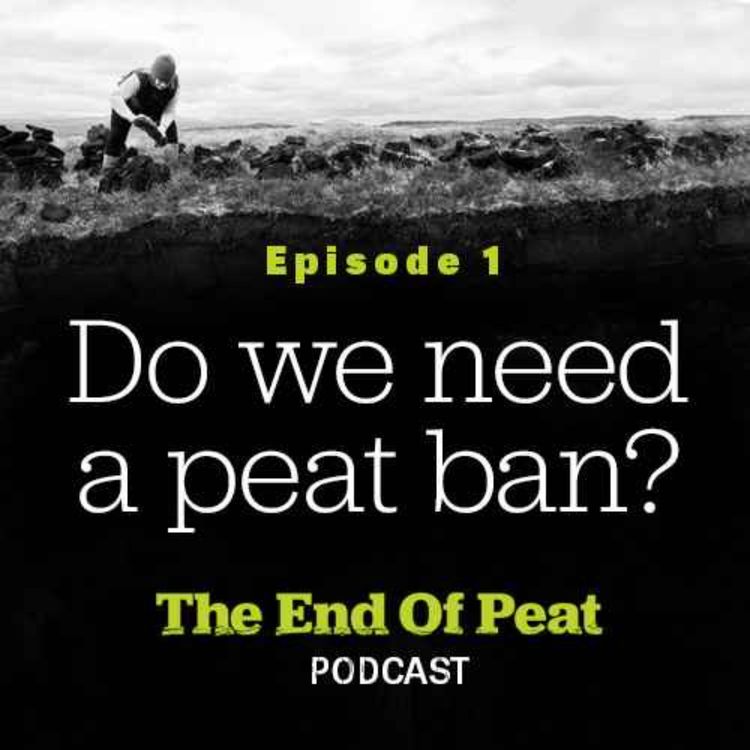Share

HortWeek Podcast
The End of Peat: Episode 1 - Do we need a peat ban?
HortWeek presents The End of Peat, a new four-part podcast series that will hear from leading horticulturists and garden retailers as they navigate a transition to peat-free that is piling pressure on a sector facing stresses on all sides.
Peat is one of the most popular and reliable types of growing media for plants, but peatlands are also a valuable store for carbon and as the UK Government tries to meet net zero targets, a peat ban is on the agenda.
Over the four episodes, Christina Taylor explores the story of the UK peat ban, how the horticulture industry is facing up to the challenge, and how it might shape the future of the sector.
Christina asks:
- Do we need a peat ban?
- Why is the transition to peat-free causing so much division and proving so difficult?
- And as the sector navigates the numerous challenges, she asks what is needed for the sector to survive, if and when peat ban legislation actually comes into effect.
In Episode 1: Do we need a peat ban? Christina unearths why a peat ban is being proposed and outlines some of the arguments for and against.
It examines the history of peat use in the UK, the properties of peat and peat-free growing media, and begins to unearth why the topic has so bitterly divided the horticulture industry.
The End of Peat was written, produced and presented by HortWeek digital content manager Christina Taylor
More episodes
View all episodes

21. Organised crime and garden centres, influencers, marketing, garden visitors and peat-free
32:01||Season 6, Ep. 21HortWeek editor Matt Appleby and senior reporter Rachael Forsyth report on the essential horticulture stories of the week.HortWeek editor Matthew Appleby and Rachael talk about:Ruxley Manor Garden Centre takes on organised crime by installing extensive security and anti-theft measures Marketing tips from IPM Essen where the watchword was 'innovation'Pros and cons of influencers for horticulture marketingPeat panel at the BOA Conference gauges the direction of travel, sentiment, quality and the EU on going peat-freeSociety of Garden and Landscape Designers award winnersRBG Kew's Orchid Festival + climate resilience, visitor numbers, engagement and plans to improve itHortWeek's plans for Parks & Gardens Week - taking place 23-30 March 2026 - details TBCDo check out our huge archive of HortWeek Podcast interviews with an unrivalled selection of prominent and fascinating figures from all corners of the horticulture sector.Podcast presenters: Matthew Appleby and Rachael ForsythPodcast producer: Christina Taylor
20. Grower peat/peat-free panel calls for Government direction and better retail products - recorded live at British Ornamentals Conference 2026
32:12||Season 6, Ep. 20HortWeek's panel at the BOA conference 2026 analysed in-depth how growers and suppliers are working towards peat-free, with the big messages being that retail product needs to be better and that the Government needs to offer clarity to the horticulture industry.Panellists were Chris Reid, Westland head of technical – growing media,, David Denny of the HTA, Robin Squance, ex-Brookhouse Nurseries and BOA technical committee chairman, Michael Smith – W D Smith & Son, and Steve Carter – Responsible Sourcing Scheme and Fleurie Nursery.Find out more HERE
19. The multiple benefits of horticulture apprenticeships for businesses, new entrants and existing employees
45:33||Season 6, Ep. 19Apprenticeship Week for 2026 starts 9 February so HortWeek has brought together two specialists in horticultural apprenticeships to explain how they work, the various options available and the vast array of benefits for employers and employees alike.Speaking to Rachael Forsyth in this episode are:Christa McDermot from BCA (Berkshire College of Agriculture) runs a range of land-based courses including horticulture.Helena Bassop from Euphorbia gardens and vice chair of the Chartered Institute of Horticulture Education and has a background as a lecturer, course manager and is an apprenticeship endpoint assessor.
20. How do we understand and reach today's plant consumer? - Michael Perry hosts a IPM Essen Panel on effective plants marketing
35:41||Season 6, Ep. 20Bruce Harnett of Kernock Park Plants, Megan Green of Hayloft Plants and Yvonne Marquenie of Plants & Flowers Foundation Holland joined <i>HortWeek</i> new plants writer Mr Plant Geek Michael Perry on a panel at IPM Essen to discuss how the horticulture industry should understand today’s plant consumer.They discussed: 1. The peat-free and sustainability dilemmaThe transition to peat-free media remains the industry’s most "hot-button" issue, particularly in the UK.Kernock Park Plants (KPP) went 100% peat-free in 2024 and Bruce Harnett says that sustainability (biomass, water self-sufficiency) is a moral choice, even if the "commercial advantage" is currently unclear.Panellists agreed that, for consumers to fully switch, peat-free media must be equal to or better than peat. Currently, some "staunch" growers still believe peat performs superiorly.But while sustainability is a growing concern many consumers still "turn a blind eye" when price is a factor.2. Innovation vs. "Trust Erosion"Should the industry stop introducing new plants? The consensus: Innovation must have purpose.KPP uses a rigorous trials process to ensure only "the best of the best" hit the market. Introducing novelty without value leads to "trust erosion."Plants like Salvia ‘Hot Lips’, Lavender ‘Hidcote’, and standard Rosemary remain dominant because they are reliable. Consumers value the "tried and tested" for mail-order success."TikTok Plants": Novelties like the TomTato or "family" apple trees resonate with younger, online audiences, but the industry must distinguish between viral aesthetics and long-term garden performance.3. Multi-platform marketingThe panel discuss approaches and strenghts of different platforms:YouTube: ideal for practical "how-to" guides.Instagram/Pinterest: use aspirational/inspirational imagery.Facebook: focus on community and storytellingMeanwhile Matthew Perry raises concerns about influencers who focus on garden aesthetics rather than plant health. The panel stresses the need for authentic voices over "unattainable" glossy imagery.And Megan Green says that, for Hayloft, 75% of business is now online, though the physical catalogue remains a valued tactile experience for a core demographic.4. The "Holy Grail" of 'engagement'Green highlights the power of visual merchandising—linking the plant, compost, and pot in one display to remove customer friction.QR codes on labels and improved storytelling are seen as the "Holy Grail" for garden centres to provide info at the point of purchase.Research shows search behavior is often driven by nostalgia (especially in herbs) and the desire to care for others (gifting).5. Reaching the Next GenerationYounger consumers represent the future but are the hardest to recruit due to a lack of gardening space and lower spending power. Engaging them requires shifting from a "critical" focus to a "positive attitude" shift, making gardening feel attainable rather than a luxury chore.In summary, the industry must balance the marketing "pull" of new varieties with the "push" of sustainable production, ensuring that every new introduction builds consumer trust through reliability and climate resilience.
18. Turf Wars: the ups and downs of running a sports turf business, with CutCrew's Jack Churchman
42:53||Season 6, Ep. 18In an era of AI fakery and fake news, star of the CutCrew YouTube channel, Jack Churchman has built his grounds maintenance business through authenticity and it has served him well. Eschewing the 'easy' money of kit sponsorship, he has won respect, credibility and work by sticking to his principles and maintaining standards.Inspired by his mum and grandad who were keen gardeners, he got his first job at a golf course at the tender age of 9. After a spell in the military he used his spare time to work for free on gardens and golf courses during the pandemic and gradually turned it into a business. Blessed with a ferocious work ethic, tenacity, resilience and a restlessness, he now at least partly attributes to ADHD, Churchman built his landscape maintenance business from the ground up and he is candid about the challenges of finding finance to grow his company with "no mummy and daddy to lend me £100k or whatever". As much as YouTube has served Churchman, it has drawn some unwanted attention, tipping off burglars looking to move expensive machinery to competitors trying to sabotage CutCrew by trolling, misrepresenting and even stalking him. Despite the dramas, however, he maintains "the benefits far outweigh the negatives".But interspersed with laughs and self-deprecation that have made Churchman such a YouTube phenomenon, is frank discussion of the challenges of running a business, negotiating competition, issues with late payment, spreading of risk, pricing, cost pressures and being responsible for people's livelihoods. The podcast is also littered with tips and hard-won wisdom on how to win clients. And his advice to prospective entrepreneurs?: "Chase the thing you like, know and love from the beginning".Find the CUTCREW LTD | Grounds Maintenance & Tractor Action YouTube channel here: https://www.youtube.com/@cutcrewltd
17. Are UK garden centres underperforming? Dries Jansen from Garden Center Advice on data that could boost your yield per sqm
33:49||Season 6, Ep. 17View slides and Vodcast edition at https://www.hortweek.com/article/1944940In this edition of the HortWeek Podcast, Matt Appleby spoke to Dries Jansen of Garden Center Advice talking about how to optimise garden centre operations for profit through layout, assortment, and realisation.Jansen began his career as an analyst at Intratuin in the Netherlands, working with 56 stores and €250 million turnover. He used trends and data back then to identify predictable patterns.But now, working alongside leading garden centre architect Fred de Rijcke, Jansen has combined data from HortWeek's exclusive annual Top 250 Garden Centres with insight from the garden centre markets in the Netherlands, Germany, France, and Belgium, to create a comprehensive decision-making model for the UK market. The data analysis system maps annual turnovers against store area, various variables and individual store offerings, proximity to population centres and other key metrics. Combining these data sets he finds an 'average' yield per sqm that all garden centres can be measured against. Individual stores can be indexed to understand how they are performing and whether they may benefit from further investigation to find ways to improve that performance. Stores identified with 'potential' to improve are profiled individually to assess their performance in various metrics, eg. ambience, service, price etc. and action points can be generated to help boost turnover.Jansen refers to slides and images during the podcast - to view these or see the video version of this podcast, CLICK HERE
16. HortWeek's Matt, Sally and Rachael make their predictions for horticulture in 2026
31:55||Season 6, Ep. 16HortWeek editor Matthew Appleby, senior reporter Rachael Forsyth and technical editor Sally Drury make their predictions for horticulture in 2026.JUMP TO00:02:16 - weather00:06:24 - cost pressures00:14:20 - volunteers00:15:27 - imports/exports/SPS agreement and UK plant production00:17:15 - pests & disease00:19:08 - climate change and innovation00:20:17 - Turf - turfgrass breeding and appreciation of grass and grass eating! 00:23:02 - readiness for spring and an early Easter and how to monetise the 'fallow' post Christmas period00:27:43 - sharing of knowledge and raising of professionalism in the horticulture industryCheck out our huge archive of HortWeek Podcast interviews with an unrivalled selection of prominent and fascinating figures from all corners of the horticulture sector.
15. Can rock dust save UK soils and rock horticultural production? with Veolia's Jennifer Brodie
22:50||Season 6, Ep. 15Studies such as that of McCance and Widdowson have revealed dramatic drops in fruit and vegetable mineral content since the 1940s. This week's guest on the HortWeek Podcast Jennifer Brodie believes that 'rock dust', a by-product of volcanic rock mined for road construction and rich in minerals trapped since the pre-dinosaur era, could help reverse this by remineralizing the soil and feeding microbes that will re-fortify plants.Brodie has come full circle in her career and is now returning to her passion project 12 years after she founded REMIN (Scotland), which pioneered the use of rock dust as a top dressing for soil, compost mixer and activator.Now leading the Pro-Grow rock dust division for resource management company Veolia, she explains the geology behind basalt rock dust, its dual benefits for plant health and carbon capture, and how the industry is shifting toward "ecological transformation".She details how some of the 400,000 tonnes of green waste they process annually is integrated with rock dust to create a PAS 100-certified compost for the garden retail market. Her goal now is to expand rock dust's use into the organic farming sector.Quoting Soil Association founder Lady Eve Balfour, Brodie says: "Everything begins to matter when the rate of soil erosion exceeds the rate at which life can invade the mineral rock underlying the soil and convert it into soil." Brodie believes that rock dust has an "unrecognised" role in rectifying the mistakes of the past and helping renew soils for the benefit of all.Make sure you never miss a HortWeek podcast! Subscribe to or Follow HortWeek podcasts via Apple Podcasts, Spotify or your preferred podcast platform.
14. HortWeek on Horticulture in 2025 - Review of the Year
39:02||Season 6, Ep. 14HortWeek editor Matthew Appleby, senior reporter Rachael Forsyth and technical editor Sally Drury share their top horticulture stories of 2025.JUMP TO...00:00:43 - horticulture and peat-free00:04:10 - developments in Biodiversity Net Gain00:07:26 - remote mowers, new technology and implications00:13:13 - loss of horticulture colleges and new learning options00:17:54 - the impact of drought in 2025 going into 202600:21:30 - how horticulture is turning to battery-powered kit00:26:20 - diversity, inclustion and equity in horticulture00:30:34 - border inspections - imports, exports and an SPS agreement for 202600:36:42 - what are the team looking forward to in 2026?Do check out our huge archive of HortWeek Podcast interviews with an unrivalled selection of prominent and fascinating figures from all corners of the horticulture sector.Podcast presenters: Matthew Appleby, Rachael Forsyth and Sally DruryPodcast producer: Christina TaylorMake sure you never miss a HortWeek podcast! Subscribe to or Follow HortWeek podcasts via Apple Podcasts, Spotify or your preferred podcast platform.